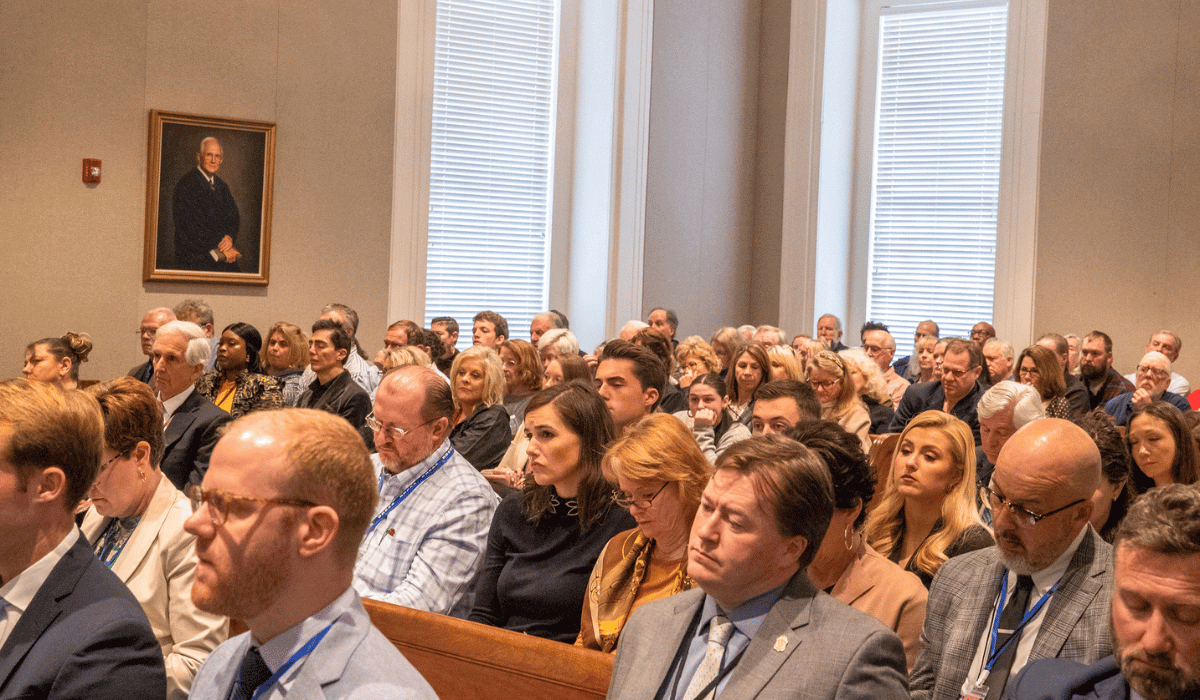This month, LUNASHARK producer Sam Berlin followed three cases around the country, including the exoneration of an innocent man out of Missouri who recently appeared on Cup of Justice #123, a family in California who recently received a multimillion dollar judgement in their wrongful death suit and more allegations of inappropriate behavior between former police officers and young women in Oregon.
We’re also following numerous other cases of corruption around the country, so stay tuned for our next Corruption Watchlist. As always, if there are cases you would like us to look into, please reach out to us on Discord or by emailing members@lunasharkmedia.com.
The Exoneration of Darryl Burton, St. Louis, Missouri
At just 22-years-old, Darryl Burton found himself wrongfully accused and convicted of a murder in Missouri. Now, after his exoneration, Burton works as a pastor, motivational speaker and as co-founder of The Miracle of Innocence.
In 1984, Darryl was accused of shooting and killing 26-year-old Donald Ball at a gas station. Ball was shot at the same gas station a year earlier by a rival drug dealer, according to The National Registry for Exoneration.
A month after the murder, two witnesses came forward accusing Burton of the crime. According to reports, witnesses told police that the individual who shot the gun had a light brown complexion and was about 5’5. Regardless of the fact that Burton had a darker complexion and stood about 5 ’10, he was charged with capital murder.
A few months after that, one of the witnesses recanted their statement, admitting that they made a factually incorrect statement to get a lenient sentence for a separate crime. After one hour of deliberations, the jury convicted him. He was sentenced to life in prison without parole.
Burton lived in prison for 24 years of his life, where he wrote over 600 letters pleading for exoneration. US Supreme Court Justice Sandra Day O’Connor noted that while she believed Burton was innocent, she “could find no legal basis upon which to hear the case.” Until 2008, when prosecutors dismissed Burton’s charges following a state petition for writ of habeas corpus due to the false evidence.
Burton joined Cup of Justice hosts Mandy Matney and Eric Bland for an exclusive interview in March to discuss his life before and after his wrongful imprisonment. You can listen to that episode here.
Family Receives $11 Million Judgement Following Wrongful Death Suit Against Teen’s Alleged Stalker, Walnut Creek, California
The family of a California teenager found deceased in her family’s garage recently received a $11.6 million judgement following a civil lawsuit against Cody Baker who was 18-years old at the time and was accused of stalking the teen, according to the lawsuit.
Two years later, no criminal complaints have been filed against Baker.
Alaunna Raffield, 14, was discovered deceased in her home from a gunshot wound to the head on December 8, 2020. Although police ruled her death a suicide, Raffield’s family insists she was murdered. District Attorney Allan Grubb told Fox25 that the case does not “sit right” with him, citing many “inconsistencies.” Grubb agreed to reopen Alauuna’s case for review.
The civil lawsuit accuses then teenage Baker of causing Raffield’s death through either deliberate criminal acts or negligent actions. According to the lawsuit, local police found evidence that Baker was stalking Raffield prior to her death.
The lawsuit also cites evidence of Baker discussing a “murder video” which was allegedly deleted from his cell phone, and accuses Baker of spreading rumors that Raffield was allegedly suicidal.
Raffield’s mother, Heather, found Raffield inside the garage early in the morning on December. 8. According to Raffield’s father, Kevin, she had bruises on her abdomen and a gunshot on the left side of her head. Raffield was right handed.
No bullets were discovered, there was no note, and nobody in the home heard gunshots, according to local news outlets.
Alaunna’s father wrote within the Facebook group “Alaunna’s Angels,” that a gun powder residue test was not conducted although police confirmed they “bagged” her hands. This is typical of a death by gunshot wound as it preserves evidence, including gunshot residue.
Local police requested the family pick up property that was initially turned over for the investigation as well as interview transcripts and the police report. These reports referenced Cody Baker.
“…we got home and looked through the police report and saw the interview with that adult male we were absolutely dumbfounded that he wasn’t actually questioned or interrogated,” the post continued.
The civil suit also alleges that Baker made statements to police taking responsibility for Raffield’s death and that he made several inconsistent statements about his whereabouts the night of Raffield’s death.
In 2023, the Alaunna Raffield Fund was created. Tasked by the Oklahoma State Bureau of Investigation, the fund offers scholarship opportunities for local law enforcement partners to assist with state training programs.
Police Officer and DA Receive No Punishment After Seizing Inappropriate Images off Woman’s Phone Grant County, Oregon
After Haley Olson was pulled over and arrested in Idaho for marijuana possession on Jan. 22, 2019, she consented to have her cell phone searched. But she was unaware that her data would be shared across state lines and that rumors would begin to circulate around Grant County.
Haley filed a lawsuit alleging her Fourth Amendment rights were violated when the Oregon officials accessed a copy of her phone data that was originally collected by Idaho police with her consent. The Ninth Circuit Federal Court upheld the dismissal of Olson’s lawsuit against Grant County officials.
The Fourth Amendment protects American citizen’s rights when it comes to search and seizure of personal property. The amendment ensures that government searches are conducted lawfully, with proper warrants, probable cause, and proper consent to searches. In this case, Olson consented to her phone being searched, but not for her data to be shared across jurisdictions.
The consent form Olson signed simply stated that she has a right to refuse a search of her personal property and that consenting meant any evidence found could be taken and used against her in court.
Court documents state that the Idaho police extracted data from Olson’s phone to their computers before dropping all charges against her.
According to those court documents, Police found a business card for Olson’s boyfriend Tyler Smith indicating he worked as a sheriff’s deputy in Grant County, Oregon.
Court documents alleged that Grant County Sheriff Glenn Palmer heard about Olson’s arrest, and requested the extracted cell phone data. After he was denied, Palmer allegedly asked the District Attorney, Jim Carpenter, to acquire the phone data.
Carpenter successfully received the phone data, citing it as possible “Brady Material,” which establishes that withholding evidence that may be favorable for the defendant violates the defendant’s due process right (Brady v. Maryland (373 U.S. 83).
According to court documents, Sheriff Palmer was allegedly concerned that Deputy Smith was involved in “illegal activities” with Olson. Thus, he claimed the data in Olson’s cell phone would be important to a potential internal investigation.
The Oregon DA Carpenter told the Idaho prosecutor that the extracted data would not be disseminated to other agencies or third parties, ensuring that it would only be used for the internal investigation.
However, after receiving a flash drive containing the requested data, Carpenter requested assistance from the Oregon State Patrol and the Deschutes County Sheriff to disseminate the cell phone data. Both agencies refused, according to court documents.
Allegedly, Carpenter reviewed the data and concluded that Olson and Smith shared sensitive photos between each other. Carpenter did not discover any “Brady” material.
Palmer alleges that Carpenter offered to show him the sensitive information twice, though he refused both times. Carpenter claimed that this did not occur, and that he deleted the extraction following his review of the data.
Olson alleges she heard rumors around town regarding her arrest as well as conversation regarding what was found on her cell phone. According to court documents, Olson was allegedly referred to as the “drug dealer that likes to f**k cops,” and that there were “some pretty smokin’ pictures” being shared around the sheriff’s office.
Olson filed for a public records request. Carpenter responded to the request with a letter, stating that he was “advised” by Palmer to obtain the extraction and since outside agencies refused to review the extraction, he took it upon himself.
According to court documents, Carpenter told Olson that after taking a “quick look” at the extraction and found no evidence of criminal activity. He then stated that he deleted the contents of the flash drive.
Olson then sued both Carpenter and Palmer for violating her Fourth Amendment Rights and Grant County for violating policies (also known as a Monelle Law)
Monelle Laws were established by the landmark Monell v. Department of Social Services supreme court case, which allows individuals to sue municipalities rather than just employees for violating their constitutional rights.
The court agreed there was a constitutional violation due to Grant County law enforcement accessing her data without a warrant, consent, or probably cause.
However, the district court determined that Olson did not have a claim against Palmer because he did not actually view the photos, and that Carpenter had “qualified immunity.” Because the laws about data obtained through voluntary consent in another state were ambiguous in 2019.
Qualified immunity protects law enforcement officers as well as state and local officials from individual liability unless it can be proven that their actions violated the Constitution.
A request to appeal was denied on Feb. 10, 2025, when District Judge Karin J. Immergut, filed a response stating that the claims against Palmer were “insufficient” and that Carpenter is entitled to qualified immunity because Olson was not able to establish constitutional violation.
In another curious turn, Olson’s boyfriend, Deputy Tyler Smith, was fired from Grant County Sheriff’s office in Dec 2019 after he was arrested on “charges of child neglect, attempted rape, attempted sex abuse and fourth-degree assault.” However, Tyler was awarded $1.3 million in a wrongful termination settlement.
Are you looking into a case?
Soak Up the Sun Members have access to various guides and helpful tips for investigating cases. Check some out here:
Want more updates on these cases?
Our Premium Members also have access to livestreams of various trials and court cases including live chats with the Luna Shark team. Stay tuned for announcements on those!

We are diving deeper into the facts of this case and will keep Premium Members updated with any potential leads.
Thanks for your help as we continue to shine sunlight on corruption around the country.
Stay Tuned, Stay Pesky, and Stay in the Sunlight.





